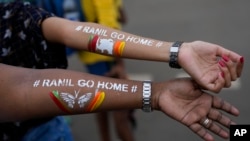Sri Lanka’s acting president Ranil Wickremesinghe has declared a state of emergency two days before lawmakers meet to choose a new president for the island nation battling an economic crisis and mired in political uncertainty.
An official announcement late Sunday said that the emergency is being imposed “in the interest of public security, the protection of public order and the maintenance of supplies and services essential to the life of the community.”
Wickremesinghe was sworn in as acting president following the resignation of Gotabaya Rajapaksa on Thursday.
A nationwide emergency was also imposed last week after demonstrators stormed the prime minister’s office. It was the third key government building they overran during a tumultuous week that led to the ouster of former President Gotabaya Rajapaksa.
But the fresh announcement caused surprise -- Colombo has been calm since the protestors vacated the buildings saying they want their struggle to remain peaceful.
“A state of emergency should be declared when the country faces a genuine threat. At the moment, while there is political uncertainty, I don’t see the reason for an emergency,” said Bhavani Fonseka, senior researcher at the Center of Policy Alternatives in Colombo. “So, there are real concerns as to why it has been imposed.”
Security had already been stepped up in the capital ahead of the vote for the president that is scheduled to take place Wednesday after nominations are made in parliament Tuesday.
Wickremesinghe is expected to be among the leading contenders, as the ruling party, the largest group in parliament, has said that it will back him, although some party members are opposed to the choice.
But the mass protests that roiled the country hahad also demanded his resignation and many demonstrators say they will continue their campaign for his ouster if he wins.
“Wickremesinghe took over as prime minister two months ago saying that he will stabilize the country, but nothing of the sort has happened,’ says Vraie Balthazar, who represents a youth group involved in the protests. “He represents the same system as the Rajapaksas. That is not what we signed up for. What we want is genuine change.”
The protestors accuse former president Rajapaksa and his family, who controlled the administration, of mismanaging the economy and of corruption.
The leader of the main opposition party, Sajith Premadasa, has declared that he will also contest the presidential polls but his party has only 54 seats in the 225-member parliament. “Even though it is an uphill struggle, I am convinced that truth will prevail," he said in a statement last week.
The presidential vote will be key for a country where political analysts say restoring stability is crucial for negotiating a rescue package with the International Monetary Fund. The country of 22 million has run out of money to import food, fuel and medicine and has defaulted on its international debt.







